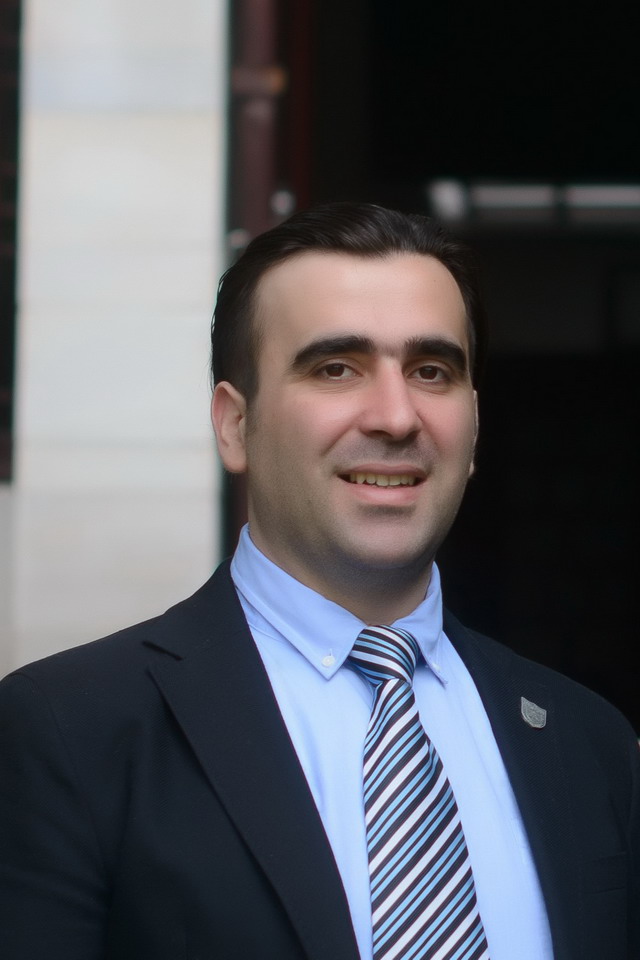Mher Davit Sahakyan

Oriental Studies
(2008-2010)
-Where do you work?
-I manage the China-Eurasia Council for Political and Strategic Studies I founded. I am a lecturer in the Chair of Oriental Studies at the ISEC NAS RA and at the Armenian-Russian University.
-What is the key to your success at work?
-I will probably change the question a bit and answer the question of what it takes to succeed. striving to make the impossible possible, always choosing a challenge challenging path that requires even more strain, will, and double work, building practical, warm relationships with people, striving to work with everyone, striving to be useful to the motherland through work. The vision of solving big problems with small forces. A sense of responsibility to get the job done in a quality and timely manner.
-What role did education at the International Scientific-Educational Center play in your life?
-It gave me knowledge and good friends, lecturers. I still keep in touch and cooperate with many of them. By the way, I later defended my thesis at one of the best universities in China, Nanjing University, where I had competed with the knowledge I had gained at the International Science and Education Center. From my multinational doctoral course at the Institute of International Relations at the University of Nanjing, so far, I have only been able to defend my thesis. My other colleagues are still writing.
-What was the biggest achievement during the studies at the International Scientific-Educational Center?
-I have received my Master's Degree with honors in Oriental Studies of the ISEC NAS RA, or as we call, with a red diploma.
-What memorable episode would you tell from student life?
-I started my Masters right after the Army, got married, worked, had lost much of my undergraduate knowledge, and had to restore and improve my language skills. At that time I was also studying at the Diplomatic School of the RA Ministry of Foreign Affairs… I had to work both at night and in the day… The memorable episode may be that I was able to overcome difficulties, manage my time properly, and achieve small but steady victories in all directions, which should lead to science. That would be the beginning of my life's journey. During that time, my regular visits to Iran are also memorable - sometimes with "hitchhikers", sometimes with my many adventures in a "professional" country, with my fieldwork in that country, and with many companies in that country due to my knowledge of the language and the country. My love for the East also led me to China, where I bought a Chinese language book and started studying… A year later, I was already in China as a PhD student at Nanjing University. I also tried to combine my previous knowledge and skills that I had acquired with the new Chair of Oriental Studies at NAS RA. So I wrote a thesis at the University of Nanjing on "China's policy at the UN Security Council on Iran and China's nuclear issues." It is also symbolic that today I am transferring my modest knowledge to the new students of the graduate students of Oriental Studies at NAS RA, already as a lecturer. In 2018 in conjunction with Mr. Robert Ghazaryan, Head of the Chair of Oriental Studies, we have organized a special course on “Reflecting China's Foreign Policy”. In October, the first China-Eurasia International Conference brought together scientists from many countries. That is to say, good memories and effective cooperation were not only in the past but also continue today.
-Your message to the graduate and postgraduate students of the International Scientific-Educational Center?
-It should be remembered that just getting a diploma does not mean anything, it will not open a job yet ... Thousands finish, but few achieve the dream ... That is why one must try to be hyperactive, acquire such skills and knowledge that will make you different from the people around you. Make connections and make connections again in your field ... but most importantly ... always be honest with yourself, your classmates, and your lecturers, and do the work assigned to you honestly. Always be free and independent, never create or accept authority, treat everything with scrutiny, and always try to find the answer to the "why" question ... and most importantly, use imagination and Read, read, read.
